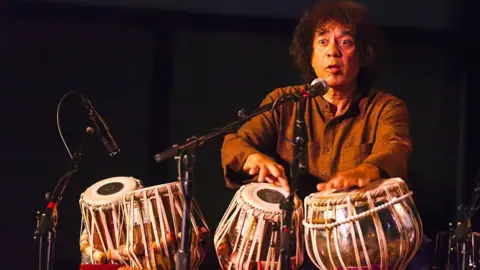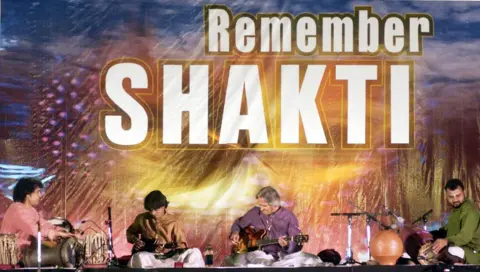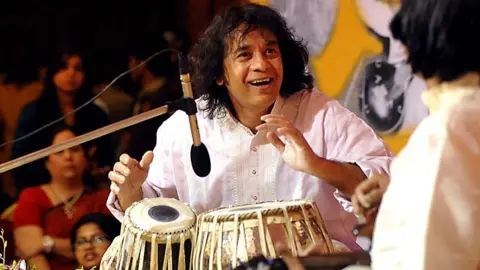 Getty Images
Getty ImagesZakir Hussain, the legendary tabla virtuoso and global ambassador of Indian classical music who has died aged 73, leaves behind a timeless rhythmic legacy that will inspire generations.
A child prodigy, he collaborated with Indian classical icons like Ravi Shankar, Ali Akbar Khan, and Shivkumar Sharma and global musicians like John McLaughlin and George Harrison.
Born on 9 March, 1951, in Mahim, Mumbai, he was the eldest son of Ustad Allarakha, one of history’s most iconic players of the tabla – a pair of traditional Indian hand played drums.
Hussain’s journey, from a child prodigy to an internationally celebrated percussionist, was a masterclass in balancing tradition and innovation.
Hussain’s life revolved around rhythm from the very beginning.
The sound of the tabla was his first language, his earliest “words”. By the age of 12, he was already performing globally, accompanying stalwarts like Pandit Ravi Shankar and Ustad Ali Akbar Khan during his teenage years.
While rooted in the Hindustani classical tradition, Hussain possessed an insatiable curiosity that propelled him to explore other genres, leading to ground-breaking collaborations across the world.
In 1973, he co-founded Shakti with guitarist John McLaughlin, a group that fused Indian classical music with jazz and Western traditions, creating a new global sound.
Over five decades, Shakti evolved, featuring luminaries like violinist L Shankar, percussionist Vikku Vinayakram, and mandolin maestro U Srinivas.
Their first studio album in 46 years, This Moment, won the Grammy for Best Global Music Album in 2024, marking a fitting finale to their 50th-anniversary tour. Hussain’s virtuosity on the tabla was pivotal to Shakti’s success and to the global appreciation of Indian rhythms.
 AFP
AFPZakir Hussain’s contributions extended far beyond Shakti.
He was a key collaborator in Planet Drum and Global Drum Project, both with Grateful Dead drummer Mickey Hart, earning him Grammy Awards in 1991 and 2008.
He worked with banjo maestro Béla Fleck and bassist Edgar Meyer on the Grammy-winning As We Speak (2024), further cementing his status as a pioneer of cross-genre collaborations. He also collaborated with musicians as diverse as Yo-Yo Ma, George Harrison, Van Morrison and Billy Cobham, bringing Indian classical music to global audiences.
His ventures like Tabla Beat Science, a fusion of Indian classical music with electronic and world music, and orchestral works such as Peshkar for the Symphony Orchestra of India showcased his unrelenting drive to innovate while respecting his roots.
“The moment you think you’re a maestro, you are distancing yourself from the others,” Hussain told Rolling Stone India magazine earlier this year. “You have to be part of a group, and not dominate it.”
This philosophy made him not only a consummate artist but also a lifelong learner and mentor.
Hussain’s flamboyance and speed and precision of his performances earned him widespread admiration.
The New York Times, in its review of a 2009 jazz performance at Carnegie Hall, described his artistry as embodying “an impish strain of virtuosity”.
“He’s a fearsome technician but also a whimsical inventor, devoted to exuberant play. So he rarely seems overbearing, even when the blur of his fingers rivals the beat of a hummingbird’s wings.”
 AFP
AFPHis accolades are as numerous as the beats he crafted.
A recipient of the Padma Bhushan and Padma Shri, Hussain was also a National Endowment for the Arts National Heritage Fellow in the United States. He delighted audiences at prestigious venues like Carnegie Hall and collaborated with jazz legends, Western classical orchestras, and Carnatic music maestros.
Despite his global acclaim, Hussain remained deeply connected to his Indian roots. His early years in a modest chawl – large tenement complexes – in Mahim shaped his values.
“For the first three-and-a-half years of my life, we all lived in one room that had no toilet. We had to use the common toilets,” Hussain told Nasreen Munni Kabir.
Offstage, Hussain was an avid reader and a fan of Isaac Asimov’s Foundation series. He loved poetry, cricket, and tennis, counting Roger Federer among his heroes. His curiosity extended to biographies of musical greats like Ravi Shankar and Miles Davis, reflecting his hunger for stories that transcended boundaries. Hussain would also later say that his TV advert for a popular tea brand – Taj Mahal – “made me famous in India”.
Hussain’s death marks the end of an era but leaves an indelible mark on global music. Kabir, who chronicled his life, aptly captured his essence: “Zakir’s extraordinary playing and the extreme sense of rigour he brought to his art made him a phenomenon.”
Music for Hussain was not just a career but a spiritual journey – a way to connect with people, traditions, and cultures across the globe.
In his final years, Hussain remained as active as ever, performing, mentoring, and composing.
“Being a student and having a drive to learn keeps me going. The opportunity to get inspired by all the young musicians out there helps me revamp myself. Age doesn’t affect my energy and drive,” he said last year.





